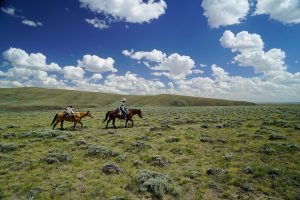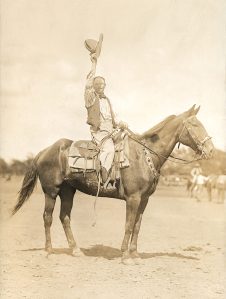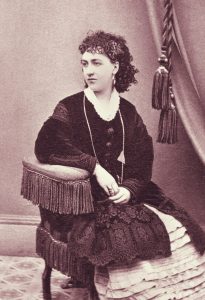Honest, witty, fearless, non-partisan, humble, wise, self-sufficient and bold—why are politicians like Houston so rare?
Just outside Huntsville, a small town in East Texas with a minor university and a major prison, there is a statue of Sam Houston made of steel and blazing white concrete that is more than 70 feet tall. Houston stands looking straight ahead, his mouth a single line of expressionless determination. He’s dressed in a fancy shirt and suit befitting a gentleman of the 19th century. There’s a cane in his right hand, and his left, having pulled back his coat, is crooked at his side. Located in a thick forest along the major highway between Houston and Dallas, the statue is a peculiar roadside attraction because curved wings of towering trees on each side obscure it from travelers moving both north and south. In fact the forest appears poised to swallow the gigantic likeness of Houston if maintenance funds run out for even a week or two.
The statue and the enveloping forest are a fitting metaphor for Sam Houston and his legacy. Houston was an outsize character who in many ways was the embodiment of Texas itself. He led a ragtag rebel army that gained Texas its independence from Mexico in 1836 and served as president of the Lone Star Republic before it became the Lone Star State. He also loved pomp and pageantry and for most of his life dressed in loud, even provocative costumes. So the sheer size and audacity of the statue is appropriate. At the same time, throughout his life, Houston was often only a step or two away from being thrust into the shadows through either his own failings or the perfidy of others. So the menacing forest is appropriate as well.
Houston was one of the most appealing characters from the Western frontier, a fact that he himself did not doubt. He was right in all the big ways—another reason why the size of the statue is fitting. He had the noble qualities of individualism, self-sufficiency and determination that we associate with the frontier, but without the mean provincialism, racism and anti-intellectualism that characterize the frontier as well. Although he owned slaves, he opposed the Confederacy, and he believed that Indians and black people were as intelligent as whites. He wasn’t perfect. For starters he drank too much. He once took in a mangy dog but then thought nothing of kicking or whipping it. But, as politicians return to the hard work of governing after a seemingly endless electoral season, it is our loss that Sam’s virtues of courage, boldness and grand purpose seem to have fallen out of the debate, except as occasional rhetoric or as parody on satirical television news shows. Perhaps it’s time to chop back the forest and ponder what made a man like this tick. On the pages that follow, we explore seven reasons why America always needs leaders like Sam Houston.
He wasn’t afraid of the unknown
HOUSTON IN HIS YOUNGER YEARS seems a lot like Huckleberry Finn. He was born in Virginia on March 2, 1793. In 1807, when he was 14, his recently widowed mother moved the family to Tennessee. As a boy he had no patience for manners or schooling, which he felt hemming him in and weighing him down. He rebelled so strongly against civilized ways, such as they were on the frontier, that at 16, fatherless for three years, with little education and no prospects in life other than farming or clerking in a store, he did what Huck Finn did—lit out for the Territory. Houston ran away from home and lived for more than two years with the Cherokees. He learned the language and followed the ways of the tribe. Even so young, he already possessed what would be a major asset in the years to come—he could make people like and admire him. The Cherokees welcomed him, which was not a certainty when he left home to join them. A chief named Oolooteka adopted him as his own son and gave him a name—the Raven—that would remain an honorific for the rest of his life.
Houston lived with the Cherokees once again later in his life and ever remained sympathetic to the interests and the cultures of American Indians. It’s often remarked in his biographies that this experience influenced him toward his benign and surprisingly modern respect for other peoples. That may well be true. But while he was with the Cherokees he also found something that he could succeed at even without education, wealth or family connections. That was living a life while playing a role.
He was brave yet witty
AFTER HOUSTON LEFT THE CHEROKEES, he enlisted in the army and fought in the War of 1812, although the fiercest action he saw was not against British soldiers but Creek warriors, who had built a strong fortress at a place called Horseshoe Bend in 1814. Houston suffered an arrow in the groin. He asked a comrade to remove the arrow but it wouldn’t budge. Houston, sword ready, demanded that he pull the arrow out, which he did. The arrow’s barb brought out a hunk of Houston’s flesh as well. During a later attack, Houston caught a musket ball in his right shoulder and another in his right arm.
Houston was such a brave soldier that he was quickly promoted from private to first lieutenant and earned the respect and patronage of the future president Andrew Jackson, who was then a major general. In the spring of 1818, Houston, then 25, began reading for the law in Nashville and in six months passed the bar. At the same time, he was full of the vigor and confidence appropriate for a young and handsome war hero. He joined the Dramatic Club, a socially prominent group that even Andrew Jackson was associated with. Houston’s height and sturdy frame made him an imposing presence on the stage. He was also a natural comedian. The director of the club said that he had never encountered another actor with “a keener sense of the ridiculous.”
From then on Houston always presented himself with great theatrical flourishes. He liked to sport the latest styles and dressed flamboyantly in all manner of hats, vests, sashes, pantaloons, shirts, coats, boots and so on. Once, he led a delegation of Cherokees to Washington, D.C. Dressed as a Cherokee, he met President James Monroe and the formidable John C. Calhoun, then secretary of war, who reprimanded him for his appearance. Years later, as a United States senator from Texas, he had a leopard-skin vest that he wore on the Senate floor. In heat and cold he wore a soft fur hat with an immense round brim. In winter he covered himself with a Mexican serape. Houston didn’t dress to please those he encountered. He dressed to present a striking pose.
He suffered for love
HOUSTON EXPERIENCED A SEXUAL, or at least marital, scandal that crushed him. Yet he never made excuses or blamed anyone but himself. In 1823, he was elected to Congress from a district that included Nashville. He was reelected in 1825 and two years later became governor of Tennessee. A future much like Jackson’s, including the presidency, appeared inevitable. But in January 1829, he married Eliza Allen. She was 19; he was 35. They did not officially separate until April, but the marriage was over after just one night. Eliza was whispering venomous words about him the very next day. No one knows why. Some have suggested that Houston’s wound from Horseshoe Bend was still oozing and disgusted her, but that is only speculation. It must have been something sexual, however, something embarrassing and delicate for each of them, since neither Houston nor Eliza ever revealed the details.
Houston resigned as governor of Tennessee in the wake of their separation. He left the state and, after another spell with the Cherokees and too much drinking and various wanderings, in late 1832 he arrived in Texas.
He risked his life for freedom
REVOLUTION WAS ALREADY BREWING IN TEXAS, and that was certainly part of what attracted Houston. In late 1835, he made a trip to New Orleans to buy a general’s uniform before there was any army for him to be general of. But, as always, he was prepared to make a striking pose. Texas declared its independence on March 2, 1836, and he was ready, uniform and all, when he was named major general of the Texas army, such as it was, on March 4. After the fall of the Alamo on March 6, General Santa Anna turned east toward Houston’s army in Gonzales; for the next six weeks, Houston’s basic strategy was one of retreat and dodging battle. This provoked considerable grumbling among the very slightly trained army. But Houston finally had his chance on April 21 at San Jacinto near present-day Houston, where he surprised the Mexican army at four in the afternoon. Houston lost six men and Santa Anna lost 630 in what turned out to be the decisive battle of the brief revolutionary war. In September 1836, Houston was elected president of the new Republic of Texas.
He turned his enemies into friends
HOUSTON FOUGHT ONLY ONE DUEL IN HIS LIFE, wounding but not killing his opponent, but he was challenged frequently. Some challenges he simply ignored, once responding, “Tell him that I won’t fight him, for I never fight downhill.” Others he escaped through his theatricality. William H. Wharton, an important figure in the Texas Revolution, supported Stephen F. Austin against Houston for first president of Texas. After some drinking, Wharton took a firm grip on his bowie knife and insulted Houston. Houston lifted his arms above his head and shouted, “Draw! Draw if you dare! Lift your hand against the majesty of Texas and the Almighty God would blast you where you stand.” Wharton, chastised, withdrew. Houston later appointed him Texas’ ambassador to the United States.
He rose above partisan politics
AS PRESIDENT OF THE LONE STAR REPUBLIC, Houston saw that its future lay in joining the United States. Not everyone in Texas agreed, and indeed there were a host of problems involving debt and property that required negotiation. But Houston recognized that Texas was too poor to remain independent for long. He served two nonconsecutive terms as president, struggling with intractable budget problems and an 1842 invasion by Mexico. Texas finally joined the United States in December 1845 and sent Houston to the Senate for three terms.
In 1861 as the Civil War was beginning, Houston, then the governor of Texas, opposed joining the Confederacy. He was still a Jacksonian who believed strongly in the Union. He was also sure Texas would be joining the losing side. During his travels as a senator, he concluded that the North’s population and industrial strength were more than the South could overcome. But Texans voted overwhelmingly to secede, and when Houston refused to take the oath of allegiance to the Confederacy, he was forced from office and became a pariah. Even his first son and namesake, Sam Houston Jr., enlisted to fight for the Confederacy. Houston retired to Huntsville where he died less than two years later, in 1863.
He didn’t abuse his power
TODAY, ONLY A SHORT WALK from the courthouse in the center of Huntsville, there is a park and a museum devoted to Houston. It is property he once owned. The log cabin, named Woodland, where he lived with his third wife, Margaret, and their family, still sits on its original site. The house is reasonably intact, although a clapboard exterior has been added. Houston’s law office, a separate building close by, is also made of logs and is a small, dark, rough, dusty place. This was the office of a man who had been governor of two states and a formidable U.S. senator, who had won a revolution and presided over an independent nation. This log office and home were all that Texas’ leading citizen had to show for a lifetime of bravery and inspired leadership. It’s not too much to hope that he retains our respect. Is it too much to hope that we can soon find a politician who combines Houston’s grand and imposing presence with his selfless deeds?
Gregory Curtis, a former editor of Texas Monthly, is the author of The Cave Painters: Probing the Mysteries of the World’s First Artists.
Originally published in the February 2013 issue of American History. To subscribe, click here.




